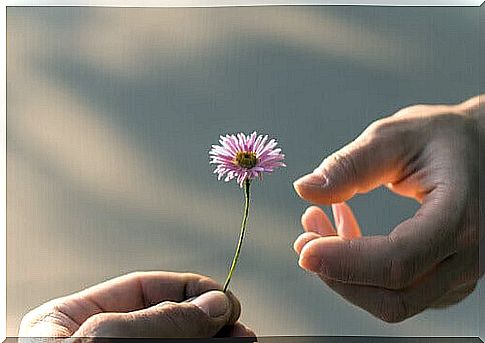Reciprocity, One Of The Bases Of Our Relationships

We live in a society that tends to make us measure everything we give and also everything that seems right to us on the basis of what we have offered in turn. We spend a lot of time evaluating what others give us back in exchange for our gifts. We have turned reciprocity into a currency of exchange.
This probably hurts us, as we often find that we are receiving much less than we think we are giving. This can make us feel that they are treating us unfairly, and it can lead us to be dissatisfied with our interpersonal relationships. Reciprocity will no longer be a pain, however, if you discover the great potential it hides for us to fully enjoy our relationships and our dedication to others.
Expect something from others
We all tend to expect something from others. When we give something, we at least expect it to come back to us anyway, and this often leads us to suffer, especially if we don’t feel paid. In this case we will feel frustrated or we will have the impression of having been used, as no one has been able to give us back what we expected.
Creating expectations, especially about something specific, can make us feel disappointed when our expectations don’t come true. It can make us rethink our willingness to keep giving and it can make us start looking at the alternative of becoming more selfish with different eyes.

Make others happy
Very often, what motivates us to give something to others is an interest in their well-being. We want them to be well, that they don’t lack for anything, etc. And, initially, we could argue that we don’t expect anything else, that we don’t want anything in return.
However, in situations where we feel bad or need support, if we see that others don’t return our help, we feel even sadder. We feel that, when we need a hand, no one is willing to give it to us, while we have not hesitated to bend over backwards for them. In this way, we begin to think that what we get has nothing to do with what we give.
The need to feel valued
Often, even if we are not aware of it, many of the behaviors we take to make others happy arise from a deep need to receive. We give, almost desperately, because we also need it to be given to us.
Unconsciously, we believe that “if we care about others, they will care about us”, and it is this mistaken belief that will lead us to suffer and that will cause conflicts in our interpersonal relationships. As you have certainly already experienced several times, things do not always go this way, and the fact that we are convinced that “it should be so” leads us to suffer.
It would be much healthier to worry only about ourselves, without expecting anything from others; and, consequently, without wanting to please them to get something in return. Of course, this doesn’t mean that we no longer have to worry about others, but that we should only do it when we really want to, preventing our mind from becoming convinced that we deserve something in return.
In this way, the satisfaction of giving something to others will turn into the only reason to do it and the engine of reciprocity, which will continue to move, but without becoming a torture for us when things do not go as we expected.

I am entitled to reciprocity
“I have a right to reciprocity” means that we must give ourselves permission to receive what others want to give us and enjoy it. If we don’t expect anything from anyone, gratitude and satisfaction will be very high.
In this way, we conceive of reciprocity as an act of freedom. Each person has the right to decide what he wants to give, when and how. And only by respecting the decisions of others can we fully enjoy the benefits of reciprocity.
Everyone can choose
Each person can choose whether he wants to give or do something for others. This is the case, no one owes anyone anything, since we are free and we are not obliged to give back what we are given, and this also applies to others.
If we understand this, we will stop measuring what others give us, because we will become aware that it is only their free choice, and that they have no duty to give us anything, even when they have received something from us. Likewise, we will stop feeling obligated to give something back or feeling indebted to others when they do us a favor.

The balance of interpersonal relationships
When we respect the decisions of others, we discover a new way of thinking about relationships. If you think about it, we happen to get a lot from people we didn’t expect anything from, and probably these people aren’t the same people we did something for before.
It is about the balance of interpersonal relationships, what guarantees that these develop in a natural way, and that at the same time they are able to surprise us in moments when we did not expect anything, and instead we receive a lot. Thus, reciprocity is transformed into an instrument of spontaneous exchange, satisfaction and gratitude.
Through reciprocity, in its healthiest conception, we will feel free and in control of our decisions, able to accept and be grateful for what others want to give us. By conceiving reciprocity in this way, we will give ourselves permission to enjoy the relationships we establish with others and all that we are able to give and receive.









